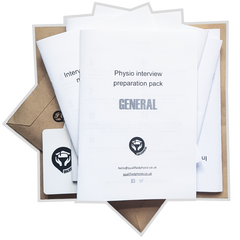by Nic Colombo
Not every single physio job opportunity is advertised. Writing a speculative application directly to the employer can be a quicker and more direct route into a job; however the process is not exactly the same as for a standard application. Read on to find out how to write the perfect spec application.

A speculative application will differ slightly from a classic application on 5 main points:
- Your background research on the clinic / organisation is crucial
- You're going to need to sell yourself even more
- You'll send a cover letter instead of a personal statement
- You'll need to contact the employer directly via email
- You'll need to follow-up yourself with a phone call
1. Background research
You probably have a list of clinics you want to apply for. Make sure of course there aren't any advertising vacancies (sometimes they are well hidden), then you'll need to do some background research on the clinic itself. Find out how the clinic operates and get a feel for what it does, it’s culture and organisation. What professions are represented? Are therapists employed, self-employed? Are different bands represented? Any plans for the clinic to grow or expand in 2019? Make sure to follow the clinic’s social media channels to keep up to date with the current events and activities.
Make some time to think about exactly what you’re want to ask them, and make sure your goals and aspirations are in line with theirs. Are you going to ask for a permanent role or fixed-term contract? It could even be an internship. Doing this research will give you an idea of where you can fit in and what angle to use to sell yourself.
2. Selling yourself
How are you going to sell yourself to the clinic? How can you persuade them that you're a good match for what they need? You need to be clear in your own mind before you start sending any applications.
The previous points will help you identify what angles to use. Have you identified anything they need or could benefit from according to their current growth strategy? What gap could you fill as a physio with your experience?
3. Cover letter
Your cover letter will differ slightly to your personal statement. It will be brief (about a page-long max) and can summarise some of the things you say in your personal statement but should really focus on why you have chosen them and highlighting what you can bring to the team. Don't hesitate to use bullet points to showcase the main skills you're offering or list some of your previous experience. Remember the person you're sending this to will have to take extra time out of their day to read your letter - so make it as clear and easy to read as possible.
Use the angles that you've identified in the previous points. In the opening paragraph explain what sort of role you’re looking for. Then move on to show you’ve done your research by explaining why you’re attracted to the organisation. Next you need to talk about your skills and experience that are relevant to the clinic and the role. Sometimes it might be best to show that you’re an all-rounder as opposed to restricting yourself by focusing on one skill or area. Your research on the clinic and their business strategy will help you with this.
You also will need to send this to someone with hiring authority, not just the main clinic email. If you can't find the relevant contact information on the company website, try searching LinkedIn or make a phone call to ask who is in charge of recruitment.
4. Email
Here's a template you can use for your email to the employer. Attach your cover letter and CV to this email.
5. Follow up
You’ll need to follow up about 10 days - 2 weeks after with a phone call. It will give the employer enough time to read your application. It will also show tenacity, perseverance and that you've really got the appetite to work for the organisation.
If you want us to review your cover letter before you send it out or to help you prepare for your interview don't hesitate to email us at hello@qualifiedphysio.co.uk or have a look on our website how we can help!
____________________
Related services

Send us your CV for a confidential review and receive personalised feedback on design, format, content, structure and ways to improve it.
Our interview preparation packs for newly-graduate and Band 5 physios.
____________
About the author

Nicolas Colombo
Nic works as a Senior Physiotherapist both in a busy NHS hospital in East London and privately. Since he qualified, he has gained a large amount of experience assessing and treating various conditions, but also meeting and working alongside all sorts of healthcare professionals. He set up QualifiedPhysio with the idea of making available to future and new physios all the advice, guidance and resources he got along the way, to bridge that gap between Uni and their first job.

